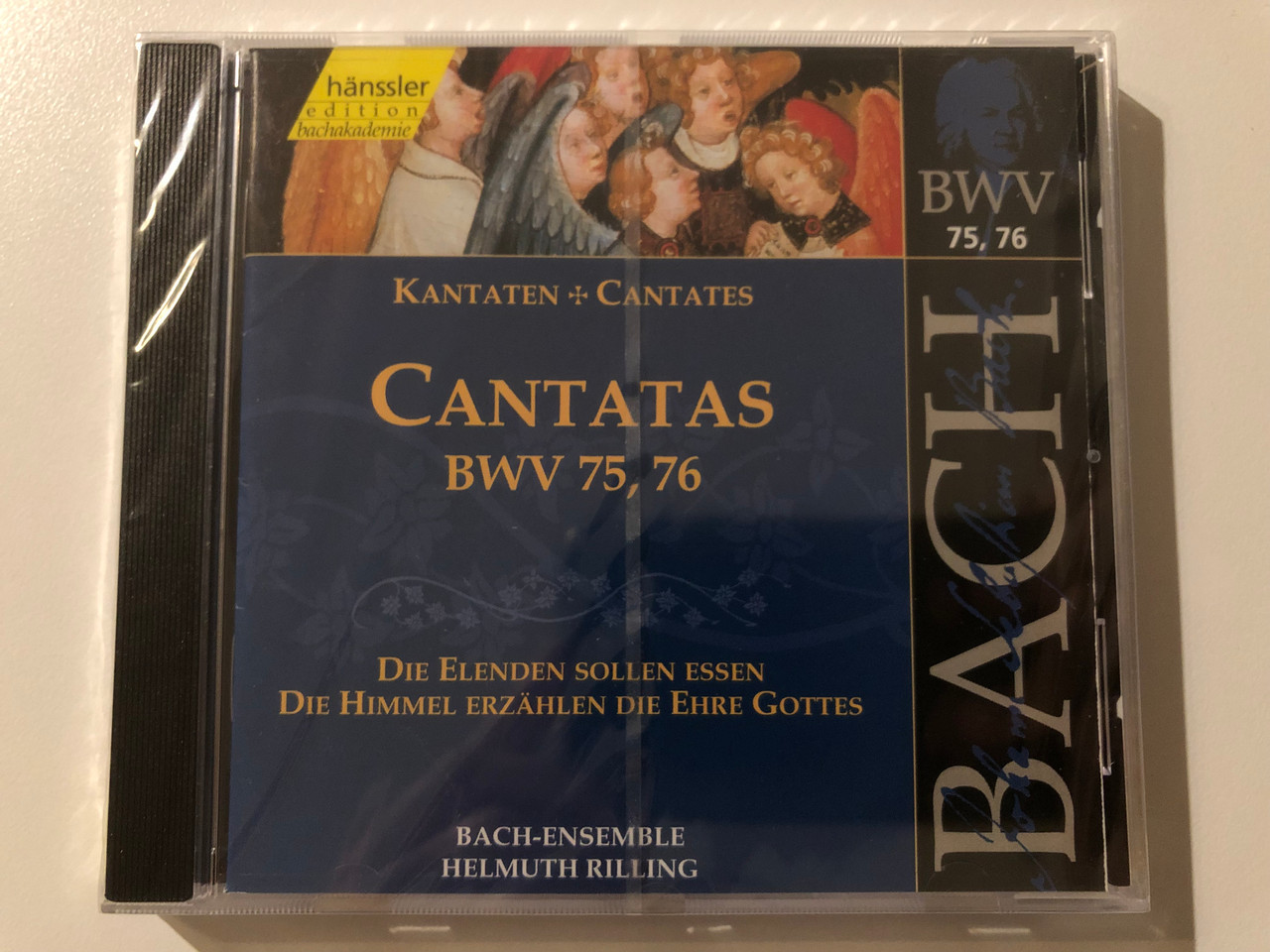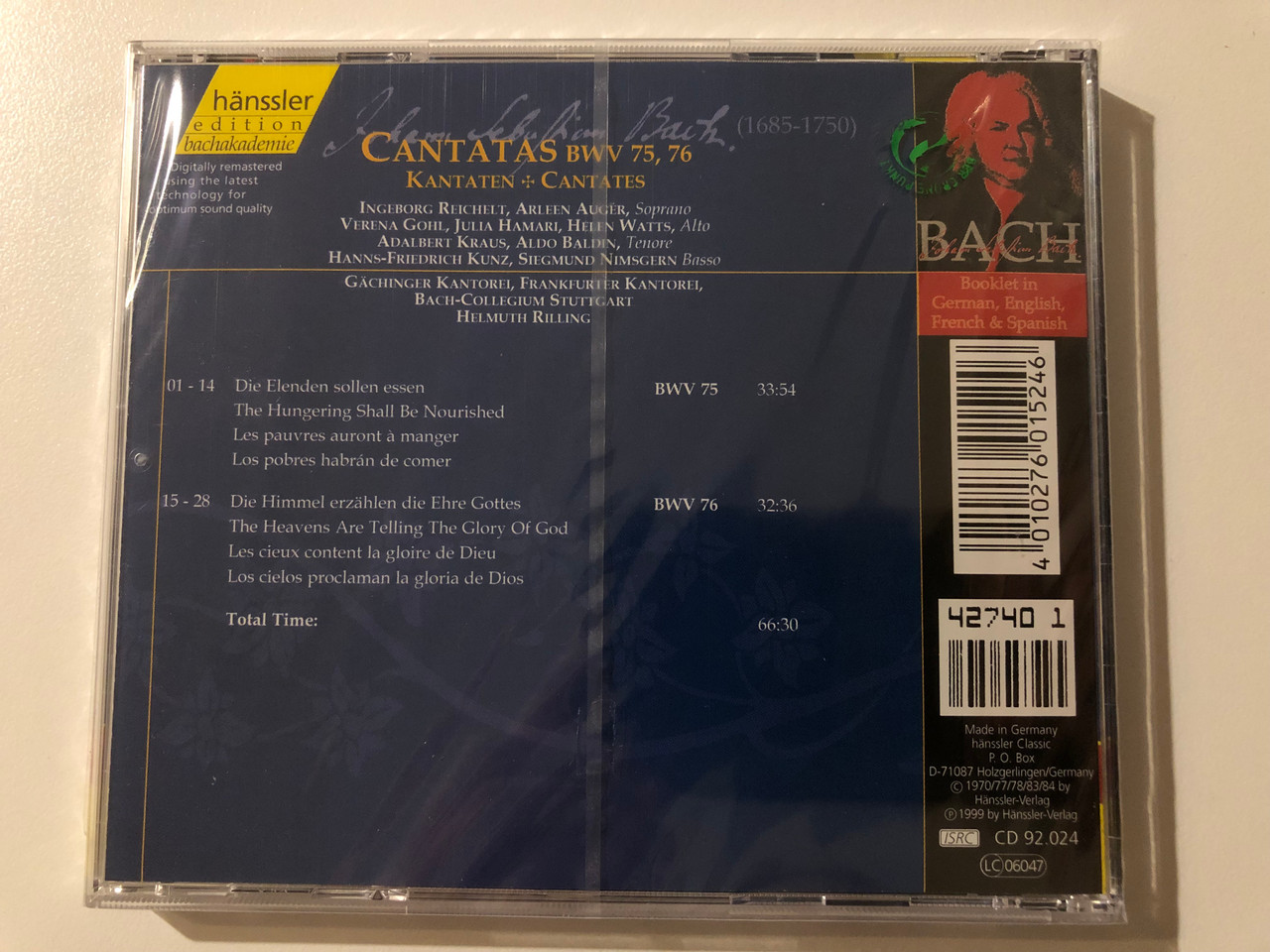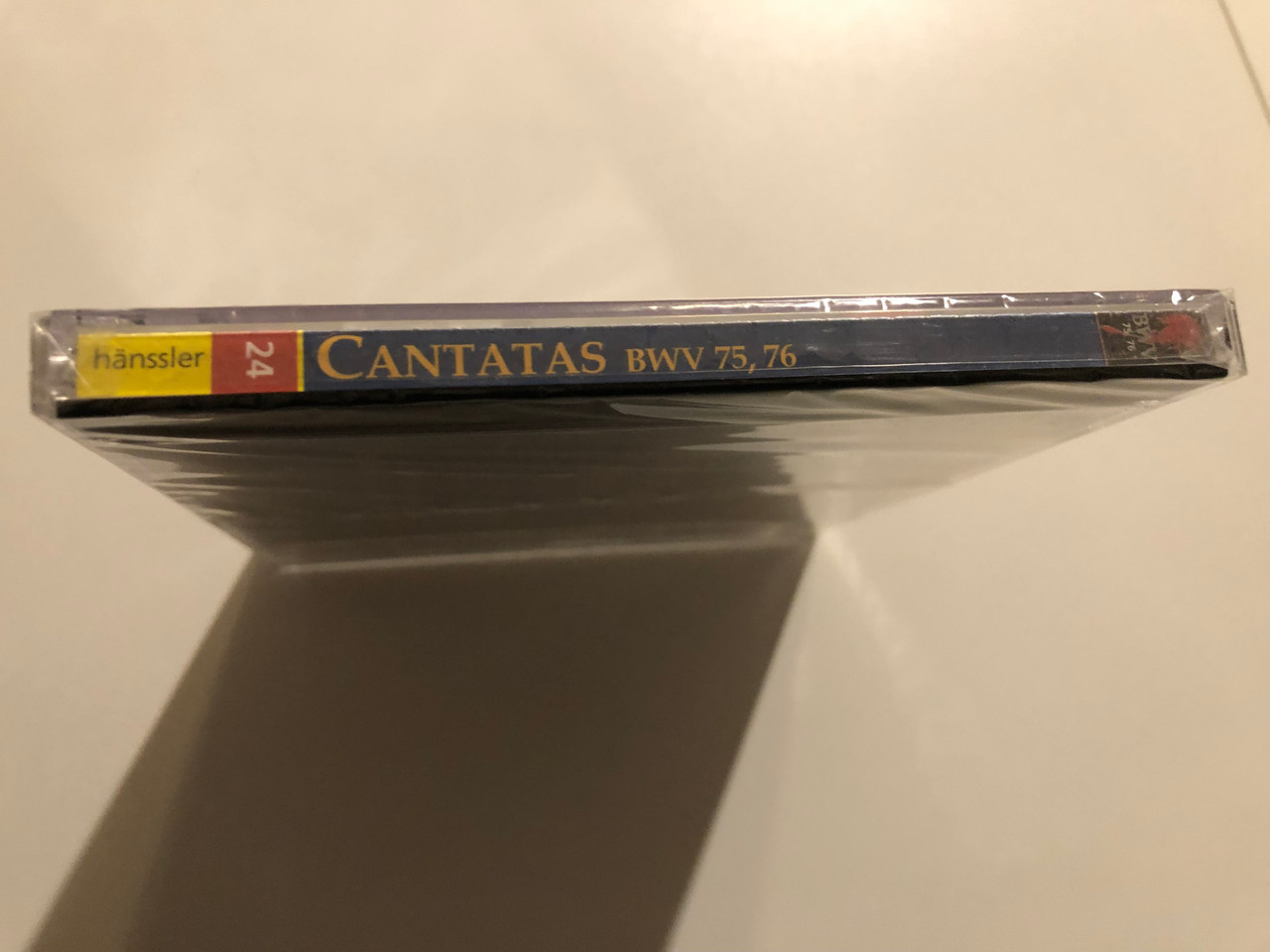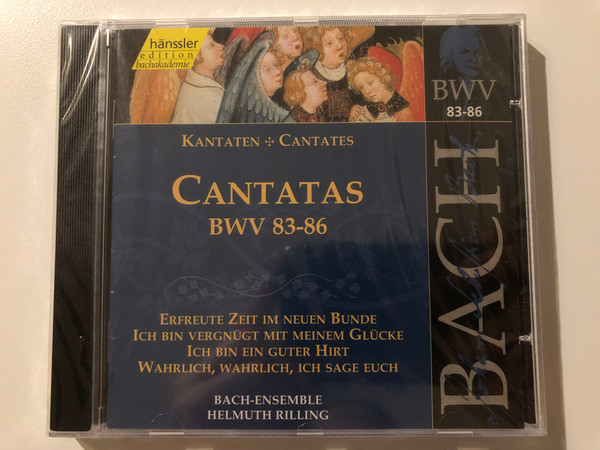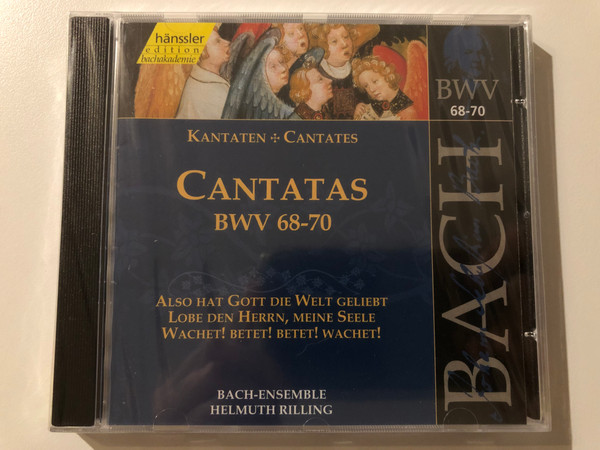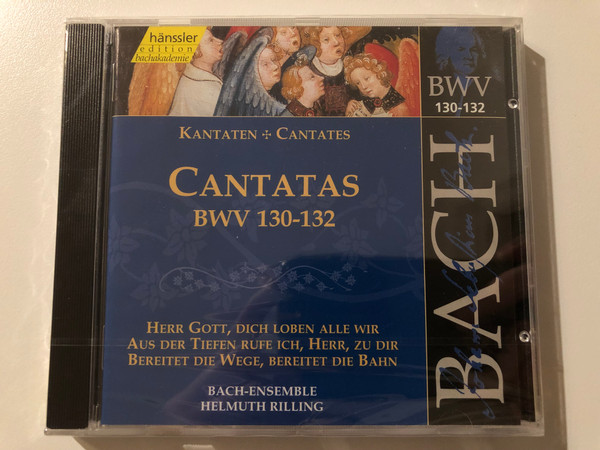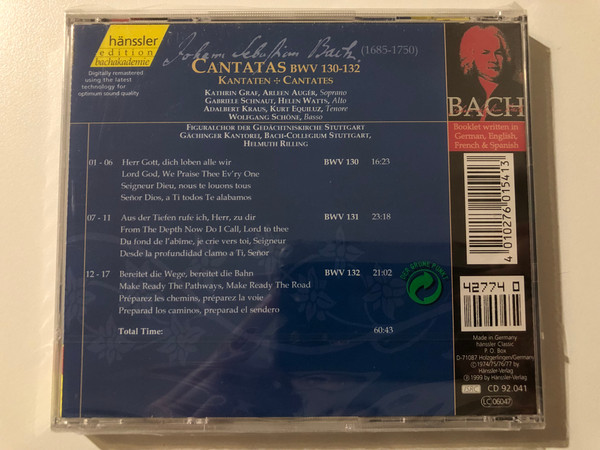Johann Sebastian Bach – Cantatas BWV 75, 76 / Die Elenden Sollen Essen, Die Himmel Erzählen Die Ehre Gottes / Bech-Ensemble, Helmuth Rilling / Hänssler Edition Bachakademie / Hänssler Classic Audio CD 1999 / CD 92.024
UPC 4010276015246
Johann Sebastian Bach composed the church cantata Die Elenden sollen essen (The miserable shall eat), BWV 75, in Leipzig for the first Sunday after Trinity and first performed it on 30 May 1723. The complex work in two parts of seven movements each marks the beginning of his first annual cycle of cantatas.
Bach composed the cantata at a decisive turning point in his career. After various positions in churches and courts, he assumed his post of Thomaskantor in Leipzig on the first Sunday after Trinity, performing this cantata. He began the ambitious project of composing a new cantata for every occasion of the liturgical year.
The work is structured in an unusual layout of 14 movements in two symmetrical parts, to be performed before and after the sermon. The unknown poet begins his text with a quotation from Psalm 22 and departs from its ideas on wealth and poverty, rich and poor, and illustrates the contrasts. The focus of the second part is on being poor or rich in spirit. Both parts are concluded by a stanza of Samuel Rodigast's hymn "Was Gott tut, das ist wohlgetan".
Johann Sebastian Bach composed the church cantata Die Himmel erzählen die Ehre Gottes (English: The heavens are telling the glory of God), BWV 76 in Leipzig for the second Sunday after Trinity of the liturgical year and first performed it on 6 June 1723.
Bach composed the cantata at a decisive turning point in his career. Moving from posts in the service of churches and courts to the town of Leipzig on the first Sunday after Trinity, 30 May 1723, he began the project of composing a new cantata for every occasion of the liturgical year. He began his first annual cycle of cantatas ambitiously with Die Elenden sollen essen, BWV 75, in an unusual layout of 14 movements in two symmetrical parts, to be performed before and after the sermon. Die Himmel erzählen die Ehre Gottes, performed a week later, has the same structure.
The unknown poet begins his text with a quotation from Psalm 19 and refers to both prescribed readings from the New Testament, the parable of the great banquet as the Gospel, and the First Epistle of John. Bach scored Part I with a trumpet as a symbol of God's Glory. In Part II, performed after the sermon and during communion, he wrote chamber music with oboe d'amore and viola da gamba, dealing with "brotherly devotion". Both parts are closed with a stanza of Martin Luther's hymn "Es woll uns Gott genädig sein" (1524).
| Label: |
Hänssler Classic – CD 92.024 |
|---|
| Series: |
Hänssler Edition Bachakademie – Vol. 024 |
|---|
| Format: |
CD
|
|---|
| Country: |
|
|---|
Released:
|
1999 |
|---|
| Genre: |
Classical |
|---|
| Style: |
|
|---|
Tracklist:
| 1 |
|
Die Elenden Sollen Essen |
4:49 |
| |
| 2 |
|
Was Hilft Des Purpurs Majestät |
1:07 |
| |
| 3 |
|
Mein Jesus Soll Mein Alles Sein! |
4:16 |
| |
| 4 |
|
Gott Stürzet Und Erhöhet |
0:42 |
| |
| 5 |
|
Ich Nehme Mein Leiden Mit Freuden Auf Mich |
5:30 |
| |
| 6 |
|
Indes Schenkt Gott Ein Gut Gewissen |
0:49 |
| |
| 7 |
|
Was Gott Tut, Das Ist Wohlgetan |
2:20 |
| |
| 9 |
|
Nur Eines Kränkt Ein Christliches Gemüte |
1:04 |
| |
| 10 |
|
Jesus Macht Mich Geistlich Reich |
2:46 |
| |
| 11 |
|
Wer Nur In Jesu Bleibt |
0:39 |
| |
| 12 |
|
Mein Herz Glaubt Und Liebt |
4:08 |
| |
| 13 |
|
O Armut, Der Kein Reichtum Gleicht! |
0:46 |
| |
| 14 |
|
Was Gott Tut, Das Ist Wohlgetan |
2:20 |
| |
|
Die Himmel Erzählen Die Ehre Gottes
|
|
| |
| 15 |
|
Die Himmel Erzählen Die Ehre Gottes |
5:12 |
| |
| 16 |
|
So Läßt Sich Gott Nicht Unbezeuget! |
1:22 |
| |
| 17 |
|
Hört, Ihr Völker, Gottes Stimme |
4:33 |
| |
| 19 |
|
Fahr Hin, Abgöttische Zunft! |
3:15 |
| |
| 20 |
|
Du Hast Uns, Herr, Von Allen Straßen |
1:37 |
| |
| 21 |
|
Es Woll Uns Gott Genädig Sein |
2:27 |
| |
| 23 |
|
Gott Segne Noch Die Treue Schar |
0:55 |
| |
| 24 |
|
Hasse Nur, Hasse Mich Recht |
2:48 |
| |
| 25 |
|
Ich Fühle Schon Im Geist |
1:05 |
| |
| 26 |
|
Liebt, Ihr Christen, In Der Tat! |
2:54 |
| |
| 27 |
|
So Soll Die Christenheit |
0:41 |
| |
| 28 |
|
Es Danke, Gott, Und Lobe Dich |
2:21 |
- Editor – Andreas Bomba
- Graphics – Stefanie Bunner
- Photography By – A. T. Schaefer
- Recording Supervisor – Richard Hauck
- Translated By – Carlos Atala Quezada, Miguel Carazo & Associates, Sylvie Roy
